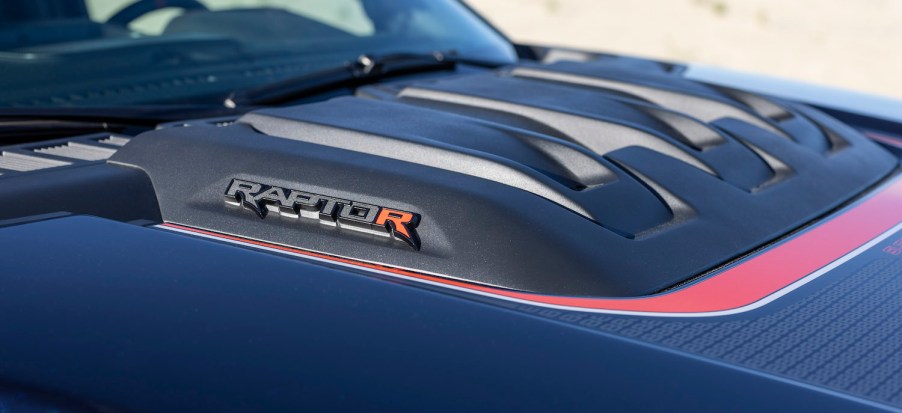
Did the Ford F-150 Raptor R Steal Its Supercharged V8 From The Shelby Mustang GT500?
Ford just dropped its latest desert racing 4×4: the F-150 Raptor R. Blue Oval fans may connect the specs of the supertruck‘s 5.2-liter supercharged V8 from the Shelby Mustang GT500. While this latest V8 may be an evolution of the GT500’s 5.2, the vast majority of its components are all-new, engineered for a very different kind of speed.
| Shelby Mustang GT500 | Ford F-150 Raptor R | |
| Engine | 5.2-liter Supercharged V8 | 5.2-liter Supercharged V8 |
| Horsepower | 760 | 700 |
| Torque | 625 lb-ft @ 5,000 rpm | 640 lb-ft @ 4,250 rpm |
| Redline | 7,500 rpm | 7,000 rpm |
| Supercharger | 2.65-liter roots-style by Eaton | 2.65-liter roots-style by Eaton |
| Supercharger Pulley | 80.1 mm | 74.5 mm |
Did the Shelby Mustang GT500 steal its V8 from the GT350
With an exotic-car-like flat plane crank V8, Ford’s 2015-2020 GT350 is one of the most unique sports cars in Mustang history. The subsequent GT500 uses the same engine block, but swaps to a more traditional cross plane crank and adds a supercharger.

To understand the Ford Raptor R’s V8 engine we have to start with the 2015 Shelby GT350 version of the Mustang. To create a one-of-a-kind Mustang, Ford pioneered a muscle car with a flat plane crankshaft.
Many European exotic car companies, such as Ferrari, prefer to build engines with flat plane crankshafts. Instead of the X shaped cross plane crankshaft common on modern cars, a flat plane crankshaft weighs less while giving up firing positions.
A flat plane crankshaft engine must be built to tighter tolerances, and often vibrates roughly at low rpms. But it can rev to high rpms very quickly and often has a very high redline. Learn more about exotic flat plane crankshaft engines.
Is the Raptor R’s V8 from a Mustang?
While Ford’s Special Vehicle Team (SVT) based the Raptor R’s new supercharged V8 on the engine from the Shelby GT500 Mustang, the two powerplants do not share many parts. This is because the engineers redesigned this 4×4 F-150 supertruck’s engine for low-end torque.

When Ford engineered a new Shelby GT500 version of the Mustang, it started with the GT350’s 5.2-liter V8. But for this new car, Ford decided to add a supercharger and swap back to a regular cross plane crank. The Shelby GT500 makes 760 horsepower and 625 lb-ft of torque at 5,000 rpm with a 7,500 rpm redline.
When Ford SVT decided to make a new top trim of the F-150 Raptor, it built its new hypertruck around an evolution of the GT500’s V8. But the new Raptor R engine was almost all new.
The Raptor R’s engine and the GT500’s are both 5.2-liter V8’s with a 2.65-liter roots-style supercharger by Eaton. These engines share intake and exhaust valves, but every part of the Raptor R engine is all-new. This includes its engine block.
Ford engineered the Raptor R’s V8 for low-end torque. Its supercharger pulley’s diameter is about 7% smaller than on the GT500. This means the Supercharger’s turbines spin faster at lower rpm. This means that it can make 640 lb-ft of torque at just 4,250 rpm. The downside is that it only makes 700 horsepower and redlines at 7,000 rpm.
The Raptor R’s V8 is engineered for off-roading

The generation of the 5.2-liter V8 engineered for the GT500 is designed for high rpm, high-speed driving. Ford made changes to the Raptor R’s V8 to prepare it for off-roading.
For example, the new V8’s headers are all-new and include cast stainless steel exhaust manifolds for durability. In addition, Ford beefed up the engine block and the ridge connecting it to the sump. The oil sump is much deeper to increase oil capacity and to ensure the Raptor R’s engine has oil while off-roading at at steep angles.
Check out an early Raptor R review or see a breakdown of the Raptor R’s new V8 in the video below:



